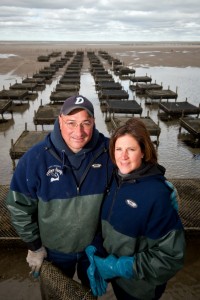From 80,000 to 8
Submitted on
Another bite from "Animal Vegetable Miracle," Barbara Kingsolver's 2007 book:
- Read more about From 80,000 to 8
- Michael's blog
- Log in to post comments
Submitted on
Another bite from "Animal Vegetable Miracle," Barbara Kingsolver's 2007 book:
Submitted on
Usually, I try to have a larger point when I post, but I haven't found it yet for this one: Still, I'm pretty sure it fits in here somewhere.
Saturday was my wife's birthday. I went about my early day, including two-plus hours in the cooperative community garden whose second season is (sadly) drawing to a close.
Submitted on
At least a few words are due AmpleHarvest.org, which allows food pantries and food growers — including backyard growers who can't eat everything when the harvest comes in — to connect with each other. The site lists 4,100 pantries in all 50 states that accept gresh produce and is still growing.
If you have more than you can use, what better solution than to look up where you can share with families in need?
Submitted on
The city Monday officially asked for proposals from non- and for-profit entities that would farm three city-owned parcels in the Dorchester section to produce "fresh, healthy food for sale in the community."
The land will be leased at $500 an acre — roughly $125 to $200 per year for a term of five years," according to the press release.
Thanks to Andrea Atkinson for pointing it out to me.
Submitted on
Welcome to the latest round of “10 words or less,” in which I ask brief questions and ask for brief answers. This installment is part of a group of interviews in advance of the Boston Museum of Science’s “Let’s Talk About Food” festival this weekend. Today’s subject is one of New England’s foremost farmers, who’ll join chefs Frank McClelland of L’Espalier, Franco Carubia of Sel de la Terre, and others in a discussion and demonstration about farm-fresh ingredients. Remember, please: No counting. 10 words is a goal, not a rule, and it’s not that easy!

Name Jim Wilson (above left, during a tour of his farm)
Age 56
Residence Lexington
Business Wilson Farm, which grows and sells produce — and lots of other goods — in Lexington, Mass., and Litchfield, N.H.
Submitted on
Welcome to the latest round of “10 Words or Less,” in which I ask brief questions and ask my respondents for brief answers. This installment is part of a group of interviews in advance of the Boston Museum of Science’s “Let’s Talk About Food” festival this weekend. Today’s subject is an oyster farmer who will collaborate with Legal Sea Foods executive chef Richard Vellante in a cooking demonstration and discussion. Remember, please: No counting. 10 words is a goal, not a rule, and it’s not that easy! Name John Lowell (pictured with his wife and business partner, Stephanie)
Name John Lowell (pictured with his wife and business partner, Stephanie)
Age 52
Residence Dennis, Mass.
Business East Dennis Oyster Farm
Motto “More is not better, better is better.”
A guilty pleasure “I like a glass of wine out on the oyster farm with my wife, and there’s no alcohol allowed out there.”
What did you want to be when you grew up? “I still don’t know the answer.”
The best job you ever had “This is it.”
Something you learned from oysters “People love oysters, and people like oyster farmers.”
Your favorite farm implement “I like the hook. They’re stainless steel, about 3 feet long. They’re used to move the gear around.”
Submitted on
It is probably impossible to live a black-and-white life, though certainly addicts like myself will try. The only route to comfortable success is to contemplate the grays and adjust when necessary.
That comes up for me today as I continue a discussion of how our family chooses its protein. To many, that might sound like liberal-sissy stuff, but we are convinced of the essential values of nutrition and responsible consumerism, and wish more people were.
Submitted on
I cannot more highly commend this post by nutritionist Kristin Wartman, which I encountered at Grist, though a tag at its bottom says a version ran at civileats.com.
Submitted on
Do I have hope? Yes, I have hope because, as Michael Pollan wrote in "The Omnivore’s Dilemma," what it means to say that something is “unsustainable” is that it will stop. And we have an unsustainable food supply.
The speaker is Joan Dye Gussow, "the mother of the sustainable food movement," as ID'd by writer Paula Crossfield, setting up her interview on Grist (and, previously, on Civil Eats).
Submitted on
From a recent Marion Nestle post:
It is not an accident that five dollars at McDonald’s will buy you five hamburgers or only one salad. It is not an accident that the indexed price of fruits and vegetables has increased by 40% since the early 1980s, whereas the indexed price of sodas has decreased by 30%. Right now, agricultural policies support our present industrialized food system and strongly discourage innovation and consumption of relatively unprocessed foods.